


The last stop of our interview trip through southern Portugal in November 2019 led us to the atelier and showroom of Emilia. A woman full of energy, passion and humour surprised us at the door, shining brightly with excitement and curiosity. It quickly became clear that she was fluent in English, spoke some German and broken bits of many other languages. Unfortunately we were terribly late, Lisbon’s streets were already dark and dimly lit, but nevertheless Emilia welcomed us with no annoyance whatsoever, quite the contrary. In the next hour we not only found out that she loves to work late at night, typically until around one or two a.m., listening to classical music and becoming so absorbed by her work that time flies, but also that Emilia keeps alive one of the oldest Portuguese knitting techniques, tapete de Arraiolos. She passes on her craft to all sorts of people.
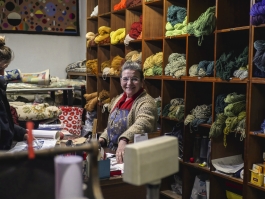
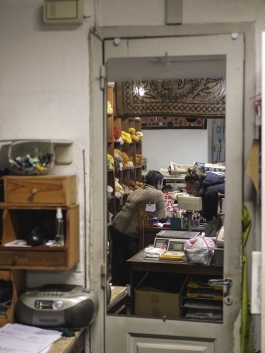
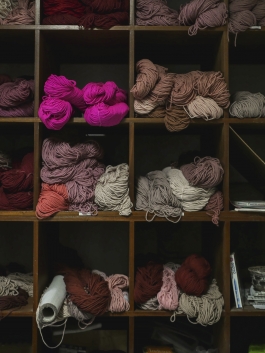
Arraiolos tapestry or Portuguese needlework carpets are embroidered wool carpets, traditionally made in the small town of Arraiolos in the south of Portugal. They date back to the Middle Ages and are typically inspired by Persian motives. At length Emilia explained to us how this ancient embroidery technique can help people, especially in today’s fast paced world. Emilia told us she works with cancer patients, adolescents with learning difficulties or really any people who wish to pursue a repetitive task that helps them focus, through active meditation. She mentioned that this particular embroidery technique quickly yields visible results and thus stimulates the satisfactory feeling of creative accomplishment.
Myriad colours make Emilia’s space welcoming and comfortable immediately upon entering, the wool is soft to the touch and eyes and hands wonder in amazement, taking in one corner after the next, each filled with a different curiosity or embroidered pattern. An incredibly long carpet spans across the entire width of the front room, she knitted it all by hand. Emilia explained some of the oldest patterns to us and how they are reinterpreted in new colours today. Frequently grandchildren come to her today, bringing along the carpets from their grandparents, demanding a similar style but with a contemporary touch. Emilia not only fulfils these wishes, but is among the few who work on such big Arraiolos rug commissions in Lisbon. Aside from her main branch of repairing old carpets, she works on commissions for hotels, private clients or designers, such as Anahory Almeida.

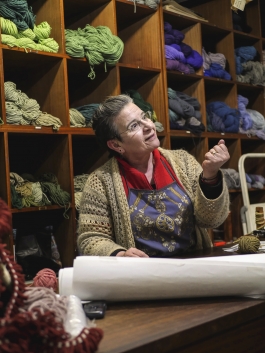
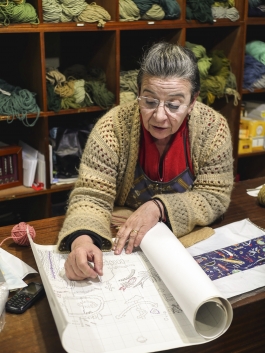
After learning about the technique from Emilia and receiving our own small kit to practice back home in Berlin, we spoke to her about the pace of today, about the value of crafts in our society and about the pressing question of local materials in our architectural realm. Her eyes were bright and clear when she spoke, her hands moved quickly and her body was agile. She opened drawers and cupboards to show us plans of finished projects, the initial designs upon which the carpets are based and the many wool colours that match together to make a plethora of compositions. It was extremely beautiful to see such a passionate woman move in her own space, where she clearly felt both enthusiastic and driven to keep her craft alive, to pass on what she has to give and to inspire generations to come, teaching that within old knowledge lies a quality and beauty worth passing on.
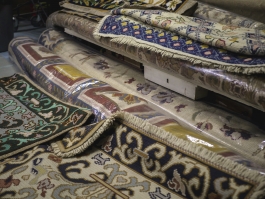

The last stop of our interview trip through southern Portugal in November 2019 led us to the atelier and showroom of Emilia. A woman full of energy, passion and humour surprised us at the door, shining brightly with excitement and curiosity. It quickly became clear that she was fluent in English, spoke some German and broken bits of many other languages. Unfortunately we were terribly late, Lisbon’s streets were already dark and dimly lit, but nevertheless Emilia welcomed us with no annoyance whatsoever, quite the contrary. In the next hour we not only found out that she loves to work late at night, typically until around one or two a.m., listening to classical music and becoming so absorbed by her work that time flies, but also that Emilia keeps alive one of the oldest Portuguese knitting techniques, tapete de Arraiolos. She passes on her craft to all sorts of people.



Arraiolos tapestry or Portuguese needlework carpets are embroidered wool carpets, traditionally made in the small town of Arraiolos in the south of Portugal. They date back to the Middle Ages and are typically inspired by Persian motives. At length Emilia explained to us how this ancient embroidery technique can help people, especially in today’s fast paced world. Emilia told us she works with cancer patients, adolescents with learning difficulties or really any people who wish to pursue a repetitive task that helps them focus, through active meditation. She mentioned that this particular embroidery technique quickly yields visible results and thus stimulates the satisfactory feeling of creative accomplishment.
Myriad colours make Emilia’s space welcoming and comfortable immediately upon entering, the wool is soft to the touch and eyes and hands wonder in amazement, taking in one corner after the next, each filled with a different curiosity or embroidered pattern. An incredibly long carpet spans across the entire width of the front room, she knitted it all by hand. Emilia explained some of the oldest patterns to us and how they are reinterpreted in new colours today. Frequently grandchildren come to her today, bringing along the carpets from their grandparents, demanding a similar style but with a contemporary touch. Emilia not only fulfils these wishes, but is among the few who work on such big Arraiolos rug commissions in Lisbon. Aside from her main branch of repairing old carpets, she works on commissions for hotels, private clients or designers, such as Anahory Almeida.



After learning about the technique from Emilia and receiving our own small kit to practice back home in Berlin, we spoke to her about the pace of today, about the value of crafts in our society and about the pressing question of local materials in our architectural realm. Her eyes were bright and clear when she spoke, her hands moved quickly and her body was agile. She opened drawers and cupboards to show us plans of finished projects, the initial designs upon which the carpets are based and the many wool colours that match together to make a plethora of compositions. It was extremely beautiful to see such a passionate woman move in her own space, where she clearly felt both enthusiastic and driven to keep her craft alive, to pass on what she has to give and to inspire generations to come, teaching that within old knowledge lies a quality and beauty worth passing on.


CONTACT
We're based in Berlin for most of the year. Our mobile office likes to follow our European vision, traveling around to where PIONIRA takes us.
CONTACT
Instagram →
Facebook →
Spotify →
More →
© 2021 PIONIRA
Imprint. All rights reserved.
Privacy Policy